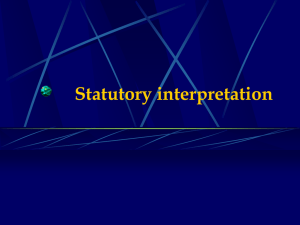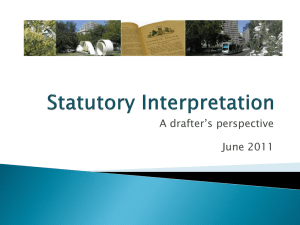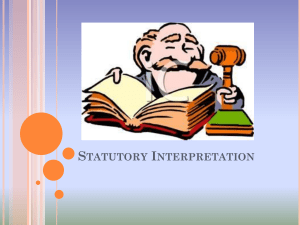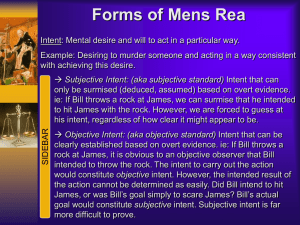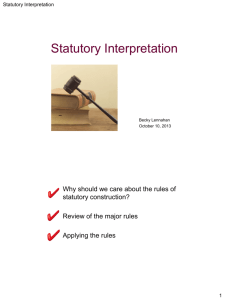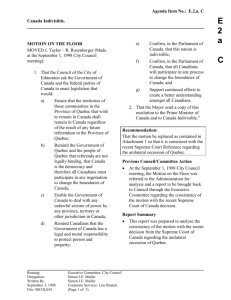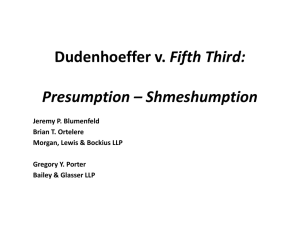The PDF Presentation
advertisement
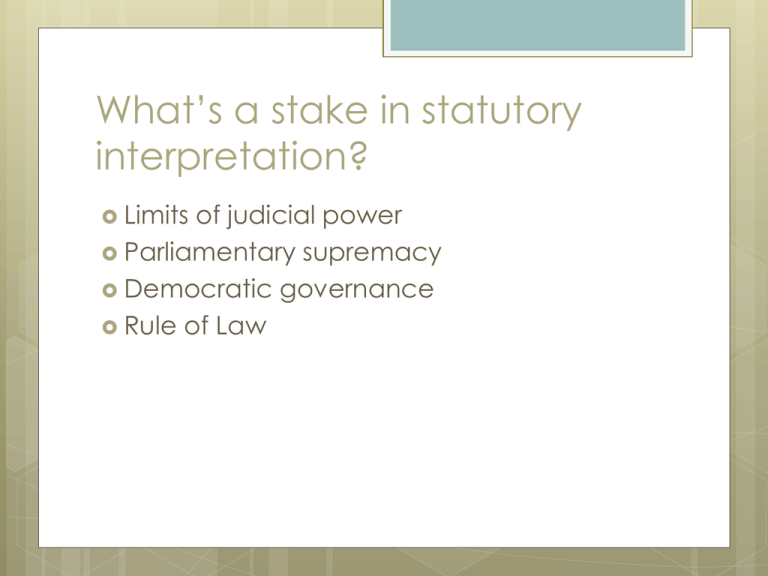
What’s a stake in statutory interpretation? Limits of judicial power Parliamentary supremacy Democratic governance Rule of Law Statutory Interpretation Three law: sources of statutory interpretation Common law principles Interpretation Acts interpretation rules within individual statutes and regulations The modern principle ‘Today there is only one principle or approach, namely, the words of an Act are to be read in their entire context, in their grammatical and ordinary sense harmoniously with the scheme of the Act, the object of the Act, and the intention of Parliament. Driedger, 1974 What this means…. Purposive interpretation has tended to overwhelm everything else, but historic interpretation ideas retain influence Most importantly clear legislative drafting will be assumed to express legislative intent. The inquiry can often stop at this point. A significant number of interpretation disputes are not just about the meaning of words Understanding the Legislature’s intent Four ways of thinking about intent Expressed intent Implied intent Presumed intention Declared intention Some presumptions about intent a statute is coherent (‘entire context’) compliance with established rules (i.e. legislature knows what it is doing) Common law, international law, Constitution, quasi-constitutional legislation Statutory Interpretation Rules and Maxims Words are used consistently in a statutory text The legislature chooses the most straightforward form of expression possible The legislature does not intend absurdity All words should have a meaning Noscitur a sociis Ejusdem generis Some Useful Presumptions Parliament is presumed not to interfere with fundamental rights Presumption against retrospective operation Presumption that penal provisions are strictly construed Presumption that re-enactment constitutes approval of interpretation Reference Re Supreme Court Act [2014] 1 SCR 433 1. 2. A classic statutory interpretation dilemma involving provisions of a statute that had not previously been judicially considered. Two questions went to the Court: Can a judge from the Federal Court of Appeal be appointed as a Quebec rep? Can the Supreme Court Act be amended by ordinary legislation? Result? The answer to both questions was ‘no’ The analysis presents a challenge to both ‘plain reading’ and ‘purposive interpretation’ ideas Supreme Court Act 1875 – as amended 5. Any person may be appointed a judge who is or has been a judge of a superior court of a province or a barrister or advocate of at least ten years standing at the bar of a province. 6. At least three of the judges shall be appointed from among the judges of the Court of Appeal or of the Superior Court of the Province of Quebec or from among the advocates of that Province. The challenge of purposive interpretation Some competing ideas about the purpose of s. 6: - To ensure sufficient civil law expertise - A political compromise - A higher standard for Quebec judges - To ensure the legitimacy of the Court - To ensure current knowledge of Quebec law - … Majority finds a dual purpose [49] The purpose of s. 6 is to ensure not only civil law training and experience on the Court, but also to ensure that Quebec’s distinct legal traditions and social values are represented on the Court, there- by enhancing the confidence of the people of Que- bec in the Supreme Court as the final arbiter of their rights. Put differently, s. 6 protects both the functioning and the legitimacy of the Supreme Court as a general court of appeal for Canada. The challenge of literal interpretation How to fit ss. 5 and 6 together? Two ways to ask the question: 1. Can a former advocate of the Quebec bar of at least 10 years standing be appointed to the Court? 2. Is it appropriate to add the temporal dimension of s 5 to s 6 when interpreting it? (Or: Is s 6 a stand alone provision?) Regarding Constitutionalization Majority and dissentients agree that aspects of the Supreme Court Act are constitutionalized Disagree on precise meaning of ‘composition of the court’ Constitutionalization is the result of the evolution of the place of the Court in our system of government (i.e. constitutionalism), not a product of 1982 text The ‘super-duper’ majority provision Statutory interpretation devices in the judgment Plain meaning Bilingual interpretation rule Contextual interpretation Consult historical record, esp Hansard Legislative history (amendments) Exclusion by implication Judges do not make law Empty vessel argument rejected
